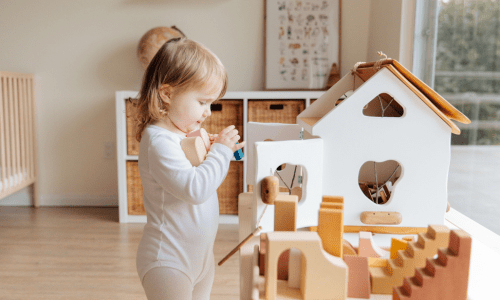Sleep is a vital component of a baby’s growth and development. However, parents often encounter hurdles, such as baby sleep regression. This article will explore the causes, signs, and practical strategies to manage sleep regression in babies. By understanding this phenomenon and implementing appropriate techniques, you can help your little one navigate through these challenging sleep disruptions.
Table of Contents
Introduction
Welcoming a baby into your life brings immense joy and fulfillment. However, the blissful journey of parenthood also comes with its fair share of challenges. One of the most common challenges parents face is baby sleep regression. This term refers to a period when a previously good sleeper experiences a sudden change in their sleep patterns. Let’s delve deeper into this topic to gain a better understanding.
What is Baby Sleep Regression?
Baby sleep regression is a term used to describe a phase where a baby who previously slept well suddenly starts experiencing sleep disturbances. During this period, your baby may have difficulty falling asleep, wake up more frequently at night, or experience shorter naps. It can be a frustrating experience for both parents and the baby.
Signs of Baby Sleep Regression
Identifying the signs of baby sleep regression is crucial in effectively managing this phase. Some common symptoms include:
Increased night waking: Your baby may wake up more frequently during the night, needing your reassurance or attention.
Difficulty falling asleep: Your baby may struggle to settle and fall asleep, often displaying restlessness or fussiness.
Shorter naps: If your baby previously took longer naps but now only sleeps for short durations, it could be a sign of sleep regression.
Changes in appetite: Sleep regression may lead to changes in your baby’s needs, with increased or decreased feedings.
Causes of Baby Sleep Regression
While the exact causes of baby sleep regression are not fully understood, several factors can contribute to this temporary disruption in sleep patterns. Some potential causes include:
Growth and development: Babies go through various growth spurts and developmental milestones, which can disrupt their sleep temporarily.
Teething: The discomfort associated with teething can make it challenging for babies to fall or stay asleep.
Environmental changes: Environmental changes can disrupt a baby’s sleep routine.
Separation anxiety: Babies may develop separation anxiety as they age, making it harder to settle and sleep alone.
Sleep associations: Babies often develop associations between specific sleep conditions, such as rocking or being held, and falling asleep. When these conditions change, it can trigger sleep regression.
How Long Does Baby Sleep Regression Last?
The duration of baby sleep regression can vary from one baby to another. On average, sleep regression phases can last anywhere from a few days to a few weeks. Some babies may experience shorter regressions that resolve quickly, while others may go through more prolonged periods of disrupted sleep. Remember that sleep regression is a temporary phase; with proper management, you can help your baby return to their regular sleep patterns.
Managing Baby Sleep Regression
While baby sleep regression can be challenging, there are strategies you can implement to help manage this phase effectively. By establishing a consistent bedtime routine, creating a sleep-friendly environment, implementing sleep training techniques, and nurturing healthy sleep habits, you can minimize the impact of sleep regression on your baby’s sleep patterns.
Establishing a Consistent Bedtime Routine
A consistent bedtime routine is vital in helping your baby transition to sleep. Establish a predictable sequence of activities that signals it’s time to wind down and prepare for sleep. This routine can include a warm bath, gentle massage, reading a bedtime story, and dimming the lights. Following the same way each night creates a sense of security and signals your baby that it’s time to sleep.
Creating a Sleep-Friendly Environment
A sleep-friendly environment can significantly contribute to your baby’s ability to sleep well. Ensure that the room is quiet, dark, and at a comfortable temperature. Consider using white noise machines or soft lullabies to create a soothing ambiance. Use a comfortable and safe crib or bassinet with a firm mattress and appropriate bedding to promote a conducive sleep environment.
Implementing Sleep Training Techniques
When it comes to managing sleep regression, sleep training techniques can be beneficial. Processes such as the “Ferber method” or “gradual extinction” can help teach your baby to self-soothe and fall asleep independently. However, it’s essential to approach sleep training with care and consult your pediatrician to determine the best approach for your baby’s age and development.
Nurturing Healthy Sleep Habits
Encouraging healthy sleep habits is crucial for your baby’s overall sleep quality. Ensure that your baby is well-rested during the day with appropriate nap times. Avoid overtiredness, as it can make it harder for your baby to settle at night. Additionally, promote a consistent sleep schedule, including regular wake-up times, nap times, and bedtime, to regulate your baby’s internal sleep-wake clock.
Seeking Professional Help
If your baby’s sleep regression persists or becomes excessively disruptive, it may be beneficial to seek professional help. A pediatrician or a sleep consultant can provide personalized guidance and support based on your baby’s unique circumstances. They can evaluate any underlying issues, provide strategies tailored to your baby’s needs, and address any concerns you may have as a parent.
Common Myths about Baby Sleep Regression
There are several misconceptions surrounding baby sleep regression. Let’s debunk some of the common myths associated with this phase:
Myth: Sleep regression means something is wrong with my baby.
Fact: Sleep regression is a normal part of a baby’s development and does not necessarily indicate a problem.
Myth: Sleep regression lasts forever.
Fact: Sleep regression is temporary and typically resolves independently with appropriate management.
Myth: Sleep regression by poor sleep habits.
Fact: Various factors trigger sleep regression, including growth spurts, developmental milestones, and teething.
Myth: Can sleep regression be prevented entirely?
Fact: While you can’t avoid regression sleep altogether, implementing healthy sleep habits and routines can minimize its impact.
Myth: All babies experience sleep regression at the same time.
Fact: Sleep regression can vary from baby to baby. Not all babies experience sleep regression at the same time or to the same extent.
Conclusion
Baby sleep regression is a common phenomenon that can disrupt a baby’s sleep patterns and challenge parents. By understanding the causes, signs, and duration of sleep regression and implementing effective management strategies, you can help your baby navigate this phase more quickly. Establish a consistent bedtime routine, create a sleep-friendly environment, consider sleep training techniques, nurture healthy sleep habits, and seek professional help. You can support your baby’s sleep and promote their overall well-being with patience, understanding, and a proactive approach.
Frequently Asked Questions
-
How can I differentiate between regular sleep disturbances and sleep regression?
Regular sleep disturbances are temporary and often occur due to external factors, such as illness or changes in routine. Sleep regression, on the other hand, is a more prolonged disruption in sleep patterns and is usually accompanied by other signs like increased night waking and changes in behavior.
-
Is sleep regression the same for all babies?
No, sleep regression can vary from baby to baby. While some babies may experience sleep regression around specific ages, others may not go through it at all. Each baby’s sleep journey is unique.
-
Can sleep regression be prevented?
It is a normal part of a baby’s development and cannot be entirely prevented. However, establishing healthy sleep habits and routines may minimize the impact and make it easier for your baby to adjust during regression periods.
-
Should I let my baby cry it out during sleep regression?
The approach to sleep training is a personal decision. It’s essential to consider your baby’s age, temperament, and parenting style. Consult your pediatrician or a sleep specialist to determine the best approach for your baby.
-
When should I consult a pediatrician regarding my baby’s sleep regression?
If your baby’s sleep regression significantly impacts their overall well-being, lasting for an extended period, or if you have concerns about their health or development, consult a paediatrician. They can provide guidance, evaluate underlying issues, and offer appropriate support.




